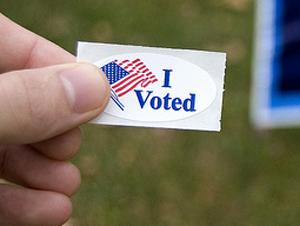Voter ID laws a contentious issue as election season heats up
(Image: flickr user: Jason (cc: by-sa))
In New Hampshire, voters today don’t need to show IDs to cast a ballot in the state’s primary.
But in 30 states across the country, when voters hit the polls this year, they’ll be required to present identification. Supporters of the new laws say they prevent voter fraud; opponents say “what fraud?”
Opponents say it’s a ploy to disenfranchise young voters, elderly voters and poor voters from going to the polls, because they tend to vote for Democrats.
Doug Chapin, a professor at the University of Minnesota, said the laws vary widely in what they require.
“Those of us who work in the field joke the one thing every state has in common is they do things differently,” he said. “It’s really a wide-range of what’s acceptable across the country.”
Everything from strict requirements to present a government-issued photo ID, probably the most controversial provision, to places where any piece of identification, with or without a photo, will suffice. And, of course, like in New Hampshire, some places require no ID at all.
About seven states have passed the strict photo ID laws, typically requiring a government-issued ID including an expiration date: Kansas, Texas, Wisconsin, Indiana, Ohio, Georgia and South Carolina. Some six others require a photo ID of some sort, though it doesn’t necessarily have to be government-issued. Without that ID, Chapin said, you can’t cast a ballot.
“ID is at that bleeding edge between the parties over fraud and disenfranchisement,” Chapin said.
Already there have been examples of perfectly legal voters who have been turned away because they were unable to get the ID needed to vote. A woman in Tennessee, for example, who’d cleaned the Capitol there for years, was born without a birth certificate. Without that, she’s unable to get a government ID. In Indiana, a group of nuns, duly registered to vote, were turned away for not having photo ID.
“As more states consider these ID bills, you’ll hear more of those anecdotes both in the legislature and after a bill is enacted in the media in the run-up to election day,” Chapin said.
But no one really knows if this will be a true problem, Chapin said.
“We really haven’t had much evidence of disenfranchisement either,” he said. “Despite anecdotes, we really don’t have any hard date about disenfranchisement.”
We know there are registered, eligible voters who don’t have photo IDs, he said, but there’s no information on how many there are. In two trials, in Georgia and Indiana, plaintiffs were unable to produce even a single person meeting that qualification, he said.
“We know they’re out there, we just don’t know in what numbers,” Chapin said.
But Chapin is quick to add that the sort of voter fraud that voter ID laws are meant to prevent, Voter A voting in place of Voter B, there have been virtually no reported cases, ever.
“We really don’t have any evidence of that,” he said. “There is no documented evidence, at this point, around the country.”
